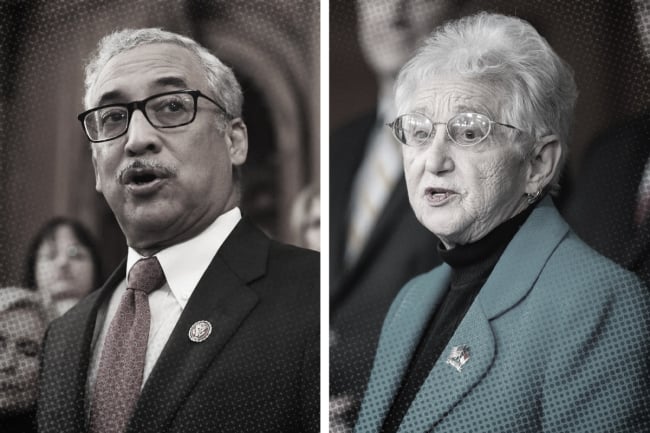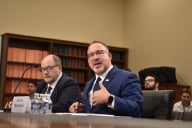You have /5 articles left.
Sign up for a free account or log in.

Leaders on the House Education and Workforce Committee are trying to attach legislation that would expand the Pell Grant to the National Defense Authorization Act.
Photo illustration by Justin Morrison/Inside Higher Ed | Getty Images
Bipartisan legislation to expand the Pell Grant to workforce training programs that run between eight and 14 weeks could move forward this week, months after the bill’s sponsors pulled it off the House floor at the last minute before a vote.
Now sponsors of the Bipartisan Workforce Pell Act are trying to attach the bill as an amendment to a national security and military bill that must pass before the end of the year. It’s one of more than 1,300 proposed amendments on the National Defense Authorization Act (NDAA) for fiscal year 2025, which could receive a floor vote this week. But it’s unclear whether the House Rules Committee will consider the Pell Grant expansion relevant to the bill when it meets Tuesday to decide on which amendments are greenlighted. Even if the amendment gets the go-ahead and passes the House, it will face a difficult road in the Senate, which has a different bill expanding the Pell Grant, which provides federal financial aid to low-income students.
The legislation’s cosponsors—New York representative Elise Stefanik, a Republican, and Virginia representative Bobby Scott, a Democrat—have made a case for including it in the NDAA. The Pell expansion, they wrote in an amendment summary, will help “equip students with the necessary skills to be prepared for work in high-demand fields that are aiding our national security and global competitiveness.” Those fields include shipbuilding and cybersecurity.
As news of this latest legislative maneuver on short-term Pell spread, labor groups, consumer protection advocates and higher education associations rallied to oppose the amendment, taking issue with how lawmakers plan to pay for the expansion—as well as the policy idea itself.
Under the bill, institutions that are subject to an endowment tax—a few dozen wealthy private colleges—would be required to reimburse the Education Department for unpaid student loans to pay for expanding the program. The American Council on Education (ACE) and 22 other higher education associations are urging the Rules committee to reject the amendment. ACE has previously opposed the legislation in part because of the pay-for., or offset.
ACE President Ted Mitchell wrote in a letter to lawmakers last week that the proposed pay-for would “establish a harmful precedent of targeting certain institutions and subjecting them to unequal status in federal programs,” and could lead some of those institutions to withdraw from federal financial aid programs, harming the lower-income students the Pell Grant is designed to help. Additionally, he said, the plan wouldn’t cover the full cost of the expansion.
“We do generally support establishing new Pell Grant eligibility, and it was our hope that this bill would have been modified to address the issues we have outlined with this offset,” Mitchell wrote.
Experts say attaching the measure to the NDAA represents one of the best chances—but not the only one—for the bill to pass the House before the end of the legislative calendar. The NDAA, which sets the budget and policies for the military, is one of the few items on Congress’s annual to-do list that must get done, so lawmakers often try to attach seemingly unrelated bills to the legislation.
Expanding the Pell Grant to short-term workforce programs is popular with the public, according to a recent poll from the National Center for Civil Discourse. Business groups, technology companies and some in higher education have backed the idea, arguing it will help low-income students access training programs they need to find better-paying jobs.
Although support for the expansion has grown in recent years with bipartisan bills proposed in both the House and Senate, talks have broken down over whether to include for-profit colleges and how to ensure that the programs are high-quality. The House legislation includes for-profits but requires them to meet certain eligibility requirements, including showing that their graduates earn more than the typical high school graduate in their state. (The Senate's version of the bill excludes for-profits and leaves out the controversial pay-for.)
Supporters of the expansion say that the eligibility requirements in the House bill are plenty stringent. Opponents have questioned the effectiveness of the guardrails in the bill and raised broader concerns about the value of short-term programs and outcomes for students.
But David Baime, senior vice president for government relations for the American Association of Community Colleges (AACC), said the guardrails contained in the House bill “couldn’t be more exacting."
The Pell Grant expansion is a key priority for community colleges, and AACC is one of a few higher ed groups supporting the legislation. Baime said while AACC is opposed to “risk-sharing,” the concept underlying the pay-for, the proposed offset wouldn’t impact students directly, and the institutional impact “remains to be seen.” Expanding the Pell Grant to short-term programs, he said, would mean money in the pockets of low-income individuals. It could make a difference for those deciding whether or not to enroll, he said.
“We think that it is well justified to invest—at very small amounts—additional resources in the lowest income students who are trying to leverage their economic position through these programs,” Baime said. The expansion, he noted, would cost less than 1 percent of the overall Pell Grant program.
Critics of the legislation, including teachers’ unions, say the pay-for could undermine programs such as Public Service Loan Forgiveness. Because universities subject to the endowment tax will be on the hook for loans discharged through that debt-relief program, they say there’s a real worry that those institutions could steer their students and alumni away from public service. They’ve also taken issue with using the NDAA to push Workforce Pell to passage.
“They’re just trying to ram it through however they can, and we’ll see what happens,” said Amy Laitinen, senior director for higher education at New America, a left-leaning think tank that opposes the legislation and the policy more broadly.
Laitinen said the issues with the legislation that prompted a wave of opposition earlier this year remain.
“It’s disingenuous to put it on NDAA, because it has nothing to do with military readiness,” she said.
The short-term programs could harm some of those they’re designed to benefit, she said. Historically, veterans and military-connected students who have access to the GI Bill have been targeted by some predatory for-profit programs.
“Veterans end up getting screwed over when these types of programs are available because they are preyed upon and promised the world and given nothing but poverty-level jobs, if they get a job at all.”








